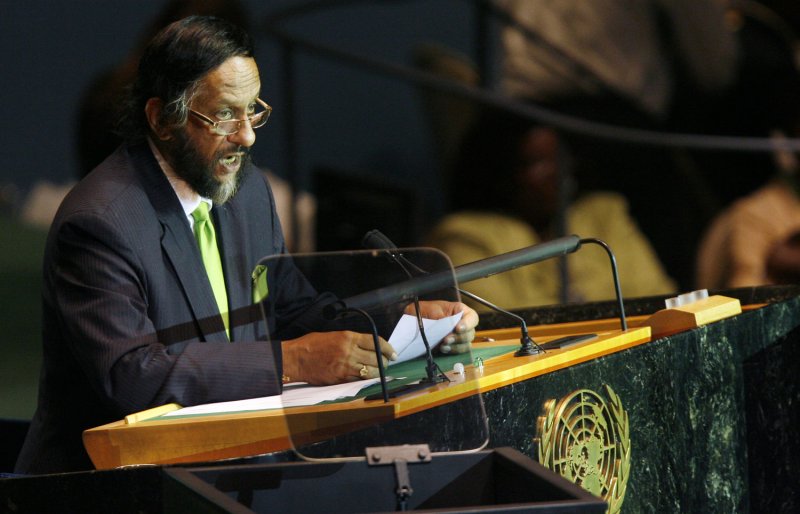Rajendra Pachauri, chair of the Intergovernmental Panel on Climate Change, speaks before U.S. President Barack Obama delivers remarks at UN Secretary General Ban Ki-moon's Climate Change Summit at the United Nations Headquarters in New York City on September 22, 2009. UPI/John Angelillo |
License Photo
GENEVA, Switzerland, March 3 (UPI) -- A Nobel Prize-winning panel of international climate scientists is looking for an outside review of its reports to avoid errors that could further damage the group's reputation.
After a series of embarrassing errors has been uncovered in its 2007 climate report, the Intergovernmental Panel on Climate Change announced that it seeks an independent review for its future studies.
"We recognize the criticism that has been leveled at us and the need to respond," IPCC Chairman Rajendra Pachauri said in a statement released last weekend.
While the details of such a review are being worked out, the IPCC feels that a fully independent body should get the job, Chris Field, a senior climate scientist at Stanford University and a co-author of the 2007 report, said Tuesday during a conference call with reporters.
Field added the IPCC report would benefit from "more eyes looking at each chapter, more expertise and more transparency." That includes double-checking whether IPCC has "appropriate procedures for recognizing and dealing with conflict of interest," he added.
It won't be easy to find an outside group to do that: Most of the world's climate scientists in some way have been or are involved in the 3,000-page IPCC report, with the remainder reviewing the numbers.
The IPCC, a panel created by the United Nations and the World Meteorological Organization, shared the Nobel Peace Prize in 2007 with former U.S. Vice President Al Gore for its 2007 report. Yet last month, the IPCC admitted the report included a false claim that Himalayan glaciers could melt by 2035. The organization had used data from a World Wildlife Fund report without double-checking, the panel admitted.
Climate skeptics have since launched severe attacks on the panel.
Richard Somerville, professor emeritus at the University of California, San Diego, and a co-author of Fourth IPCC report, said while the reports are policy neutral, attacks aren't.
"In many cases, the criticisms are motivated by policy concerns rather than scientific concerns," he said.
Yet the missteps damaged the credibility of the panel. Its 2007 report was widely hailed as the most comprehensive and detailed scientific account of climate change. It formed a basis for ongoing U.N. negotiations to produce a successor treaty to the Kyoto Protocol, which runs out in 2012.
Climate science received a further blow when e-mail exchanges -- some say they were leaked others claim they were stolen -- indicated that scientists at Britain's University of East Anglia might have suppressed data pointing to global cooling.
Penn State University's Richard Alley, an expert on how climate change affects the ice sheets and glaciers of Antarctica and Greenland and how that contributes to sea level rise, said there was no question that individual paragraphs in the Fourth IPCC report were incorrect.
"It's done by humans, we're not perfect," he said. "But these errors in no way impact our fundamental understanding that we're adding CO2 to the air, that this is turning up the Earth's thermostat, that the changes so far are small compared to what can happen under a business as usual scenario and that we continue with business as usual, it will really impact us and other living things."















